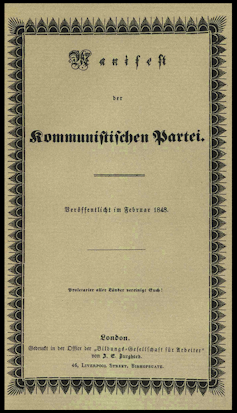How Hard Is It to Read Capital by Karl Marx
Equally the globe reflects on 200 years since the nascence of Karl Marx, his writings are being sampled by more and more than people. If you're new to the work of one of the greatest social scientists of all time, hither'southward where to beginning.
Marx's own writing
James Muldoon, University of Exeter
The long history of roughshod, totalitarian "Marxist" regimes around the world has left many people with the impression that Marx was an authoritarian thinker. But readers who dive into his work for the offset time are often surprised to discover an Enlightenment humanist and a philosopher of emancipation, i who envisaged well-rounded homo beings living rich, varied and fulfilling lives in a post-capitalist society. Marx's writings don't merely suggest a revolutionary political project; they offer a moral critique of the alienation of individuals living in capitalist societies.
ane. An Introduction to a Contribution to the Critique of Hegel's Philosophy of Correct (Available here)
Originally published in 1844 in a radical Parisian newspaper, this fascinating curt essay captures many of Marx'due south early criticisms of modern society and his radical vision of emancipation. It as well introduces several of the key themes that would shape his later on writings.
Marx claims that the conservative revolutions of the 18th century may have benefited a wealthy and educated grade, but did not challenge private forms of domination in the factory, abode and field. Marx theorises the revolutionary field of study of the working form, and proposes its celebrated task: to abolish private property and reach self-emancipation.
two. Economic and Philosophic Manuscripts of 1844 (Available here)
Not published within his lifetime, and only released in 1932 by officials in the Soviet Union, these notes written by Marx are an important source for his theory of capitalist alienation. They reveal the essential outline of what "Marxism" is, and provide the philosophical basis for humanist readings of Marx.
In these manuscripts, Marx analyses the harmful effects of the organization of labour in modernistic industrial societies. Modern workers, he argues, have become estranged from the goods they produced, from their ain labour activity, and from their fellow workers. Rather than achieving a sense of satisfaction and cocky-actualisation in their labour, workers are left exhausted and spiritually depleted. For Marx, the antidote to mod alienation is a humanist conception of communism based on gratis and cooperative production.
3. The Communist Manifesto (Bachelor hither)

Opening with the famous line, "a spectre is haunting Europe – the spectre of communism", the Communist Manifesto has become one of the most influential political documents e'er written. Co-authored with Friedrich Engels, this pamphlet was deputed by London'south Communist League and published on the cusp of the various revolutions that rocked Europe in 1848.
The manifesto presents Marx's materialist conception of history and his theory of course struggle. It outlines the growing tensions between the bourgeoisie and the proletariat under capitalist relations of product, and predicts the triumph of the workers.
4. The German Ideology (Available here)
For anyone seeking to sympathize Marxism'southward deeper philosophical and historical underpinnings, this is 1 of his near important texts. Written in around 1846, again with Engels, The German Credo provides the full development of the ii men's methodology, historical materialism, which seeks to understand the history of humankind based on the development of its modes of production.
Marx and Engels argue that individuals' social consciousness depends on the textile conditions in which they live. He traces the development of different historical modes of product and argues that the present backer one will exist replaced by communism. Some interpreters view this text as the betoken where Marx'due south thought began to emerge in its mature form.
v. Capital (Volume one) (Available here)
Published in 1867, Capital is Marx's critical diagnosis of the backer mode of product. In it, he details the ultimate source of wealth under capitalism: the exploited labour of workers. Workers are gratis to sell their labour to any capitalist, but since they must sell their labour in order to survive, they are dominated by the form of capitalists as a whole. And through their labour, workers reproduce and reinforce both the economical conditions of their existence and also the social and ideological structure of their gild.

In Capital, Marx outlines a number of capitalism's internal contradictions, such every bit a failing rate of profit and the tendency for the germination of capitalist monopolies. While certain aspects of the text have been questioned, Marx's analysis informs economic debate to this day. For anyone trying to empathize why capitalism keeps falling into crisis, it'south still hugely relevant.
On Marx and Marxism
Robert Jackson, Manchester Metropolitan University
ane. A Companion to Marx's Capital letter – David Harvey
From social movements to student reading groups, from Thomas Piketty's Capital in the Xx-First Century to articles in the Financial Times, Marx's economic writings are at the eye of argue once once more. And i of the figures nigh associated with these discussions is the geographer David Harvey.
Based on his popular online lecture serial, Reading Capital with David Harvey, this book makes Marx'due south Capital letter accessible to a broader audience. Guiding readers through Marx'due south challenging (but rewarding) report of the "laws of motion" of commercialism, Harvey provides an open and critical reading. He draws out the connections between this earth-changing text and today'south lodge – a social club which, after all, is still shaped by the economic crisis of 2008.
ii. Karl Marx: A Nineteenth-Century Life – Jonathan Sperber
For Jonathan Sperber, a historian of modernistic Federal republic of germany, Marx is "more than a figure from the past than a prophet of the nowadays". And, as its title suggests, this biography places Marx's life in the context of the 19th century. It's an accessible introduction to the history of his political thought, particularly as a critic of his contemporaries. Sperber discusses Marx in his many roles – a son, a student, a journalist and political activist – and introduces the multitude of characters connected with him. While Francis Wheen'southward well-known Karl Marx: A Life is a more freewheeling business relationship, Sperber's writing is both highly readable and more deeply rooted in historical scholarship.
iii. From #BlackLivesMatter to Black Liberation – Keeanga-Yamahtta Taylor
Writing about the US merely over 150 years ago, Marx noted that: "Labour in a white skin cannot emancipate itself where it is branded in a black skin." And the influence of his ideas near the human relationship between race and form is visible in debates right upward to the present day.
Penned by bookish and activist Keeanga-Yamahtta Taylor, who came to popular prominence in the recent #BlackLivesMatter motility, this is a timely read for those interested in the diverse ways Marx'southward thought is being rebooted for the 21st century. A penetrating book, it connects the origins of racism to the structures of economic inequality. With plenty of Marxist ideas (among others) in her toolbox, Taylor critically examines the notion of a "colour-blind" gild and the US's post-Obama order to great effect.
iv. Why Marx was Right – Terry Eagleton
A call to reconsider the widely accepted notion that Marx is a "dead dog" from renowned literary theorist Terry Eagleton. In this provocative and highly readable book, Eagleton questions the plausibility of x of the almost common objections to Marx'south idea – among them, that Marx's ideas are outdated in post-industrial societies, that Marxism always leads to tyranny in practice, that Marx's theory is deterministic and undermines homo freedom. E'er witty and passionate, Eagleton peppers his spirited defense (with some reservations) of Marx'south ideas with his own literary and cultural insights.
five. Jacobin magazine – edited by Bhaskar Sunkara (available online)
In the era of the Occupy motion, "taking a knee joint" and #MeToo, the discussion of Marx'southward ideas has gained an increasing presence on the cyberspace. One of the most notable examples is the socialist magazine and online platform Jacobin, edited by Bhaskar Sunkara, which currently reaches effectually 1m viewers a month.
Roofing topics from international politics and environmental movements to the recent instruction strikes in Oklahoma and West Virginia and Bernie Sanders'due south presidential entrada, it'south a lively source for anyone who wants to see an analysis of contemporary politics that'due south influenced by Marx'south thought.
Source: https://theconversation.com/karl-marx-ten-things-to-read-if-you-want-to-understand-him-95818
แสดงความคิดเห็น for "How Hard Is It to Read Capital by Karl Marx"